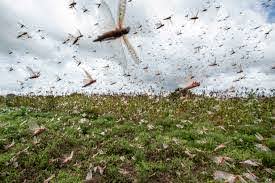The Southern African Development Community (SADC) has launched a US$20 million regional appeal for assistance in its efforts to control an outbreak of African Migratory Locusts that have ravaged crops in parts of the region.
The appeal, which was launched virtually by Mozambique’s Agriculture Minister Celso Correia on Wednesday and SADC Executive Secretary Stergomena Lawrence Tax, comes in the wake of the continuous threat posed by the locusts that have invaded the region since beginning of the year.
Correia said the funds would be used for, among other things, facilitating cross-border cooperation to effectively respond to the locust outbreak, building preparedness capacity in the region and facilitating ground surveillance, mapping and early warning for anticipatory action.
“May I therefore call upon our partners to fully support this effort with a view to combat this outbreak that has potential to proliferate not just to all SADC member states but to migrate across other regions with dire consequences for food security for the African continent,” the minister said.
The first outbreak of the locusts was reported in February and affected Botswana, Eswatini, Malawi, Mozambique, Namibia, South Africa, Tanzania and Zambia.
At the time, the affected Member States were able to control the swarms. However, there was a resurgence of the locusts in May 2020, which affected Angola, Botswana, Namibia, Zambia and Zimbabwe.
Correia said the increased spread of the swarms of locusts poses a serious threat to summer cropping and this requires SADC to act urgently in a coordinated manner to control it.
He said resources currently available from member states and other partners such as the United Nations Food and Agricultural Organisation are no longer adequate to contain the outbreak, hence the need for the regional appeal.
Tax said the outbreak of the African Migratory Locusts was a serious impediment to agriculture production and productivity, and has the potential to increase food insecurity especially with the already precarious regional food security situation caused by the persistent droughts and the impact of the COVID-19 pandemic.
“The combined impacts of COVID-19 and the African Migratory Locusts outbreak are likely to further worsen vulnerability to extreme weather patterns, among other challenges encountered in the region,” Tax said.
JN/APA


